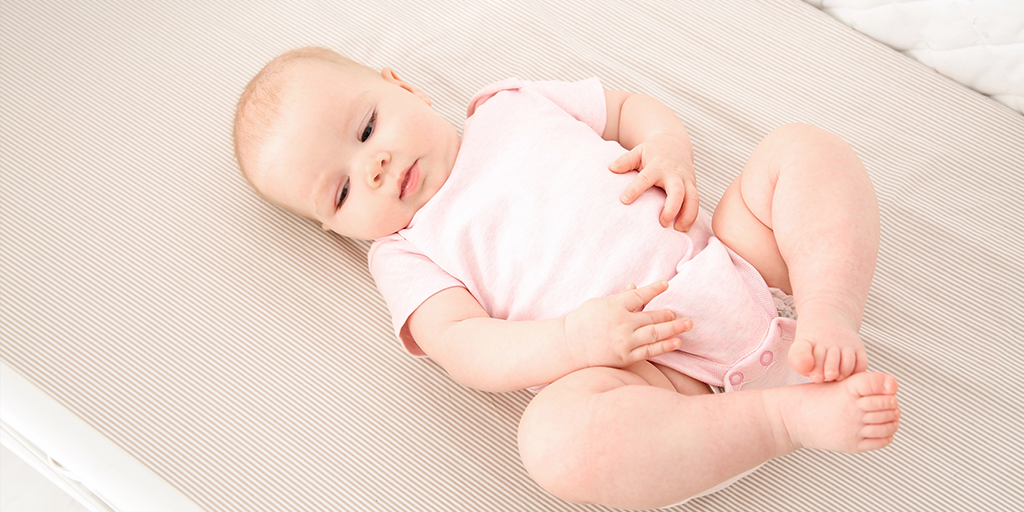As the soon-to-be-here summer heat warms our days (and if you live in the South, it’s likely already pretty hot), it also introduces a common concern for new parents: ensuring that their babies sleep comfortably through the warmer nights. Hotter temperatures are particularly challenging for little ones, who cannot regulate their body temperatures as well as adults do. Not only is overheating uncomfortable for babies, but it also increases the risk of sleep disturbances and serious conditions such as heat exhaustion.
Dressing Your Baby for Warm Nights
Ensuring your baby is comfortable during hot nights involves dressing them appropriately for the indoor temperature. Here’s how you can outfit your baby to help them stay cool and comfortable:
- Below 60°F: Dress your baby in a long-sleeve onesie, footed pajamas, and socks to keep them snug and warm.
- 60°F to 66°F: A short-sleeve onesie paired with footed pajamas should keep your baby comfortable without overheating.
- 68°F to 72°F: A onesie, either short or long-sleeve depending on how chilly it feels, should be sufficient.
- 74°F to 77°F: In these warmer temperatures, consider dressing your baby in just a lightweight onesie or, if it’s particularly warm, even just a diaper.
- Above 77°F: When it’s extremely hot, a diaper might be all that’s needed. If additional coverage is necessary, opt for a very lightweight, breathable onesie.
By choosing the right attire based on the room’s temperature, you can help ensure your baby sleeps comfortably through the night, keeping them cool in the heat and avoiding any risks associated with overheating.
Creating a Comfortable Sleeping Environment
A cool, comfortable environment helps ensure safe and restful sleep for your baby. Here are several strategies to maintain the ideal sleeping environment:
- Monitor Room Temperature: A room thermometer is essential to keep track of the temperature. This will guide your decisions regarding your baby’s clothing and bedding. If your baby monitor includes a thermometer, verify its accuracy with a standalone unit.
- Regulate Light and Airflow: Keep blinds and curtains closed during the day to block out heat but open the windows to allow for ventilation. This helps keep the room from becoming stuffy and overly warm.
- Use Fans Wisely: A fan can effectively circulate air within the room. Ensure the fan isn’t pointed directly at your baby to avoid chills.
- Manage Air Conditioning: If available, use air conditioning to maintain a comfortable temperature between 68°F and 72°F. Pre-cool the room before bedtime and adjust settings to maintain a steady temperature throughout the night.
Nighttime Checks and Adjustments
Continuous monitoring throughout the night is crucial to ensure your baby isn’t overheating:
- Regular Checks: Periodically check your baby by feeling their chest or back, which should be warm but not hot. Adjust their clothing or the room’s temperature if they feel sweaty or overheated.
- Hydration: Keep your baby hydrated throughout the day. For babies over six months, offering water in addition to regular feedings can help keep them cool.
- Cooling Bath: A slightly cool bath before bedtime can help lower your baby’s body temperature and signal that it’s time to wind down for sleep.
- Maintain a Calm Routine: Ensure the bedtime routine is relaxing and cool. Avoid vigorous play and maintain a quiet, dimly lit environment to help your baby settle down.
Practical Tips for Hot Weather Sleep
- Hydration: Regularly offer breastfeeds or bottle feeds.
- Appropriate Bedtime Attire: Lightweight, breathable fabrics like cotton are ideal. Adjust your baby’s clothing based on the room temperature and their comfort.
- Room Setup: Keep the nursery dark during the day to prevent it from heating up. At night, ensure there is a flow of air by slightly opening windows and doors, provided it is safe and secure.
- Using Fans and AC: If using a fan, ensure it does not blow directly on the baby but rather circulates air around the room. With air conditioning, set a consistent, comfortable temperature that is not too cold.
By taking these measures, you can help ensure that your baby sleeps more comfortably through the night, even during the hottest days of summer. Remember, every baby is different, and what works for one may not work for another. Stay attentive to your baby’s needs and adjust their sleep environment and attire as needed to ensure they remain comfortable and safe.

